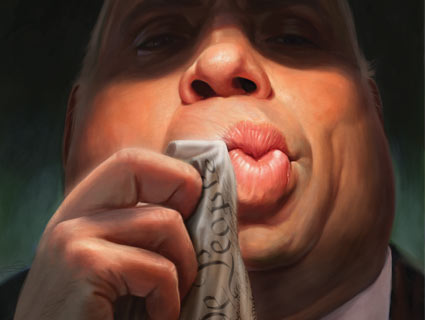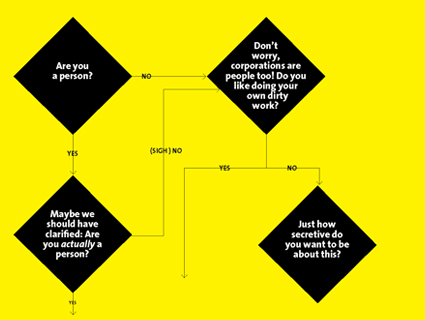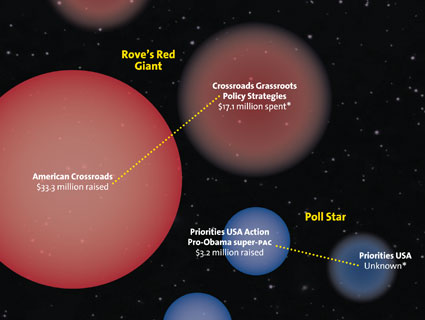| 1758 | George Washington’s successful campaign for the Virginia House of Burgesses spends £39 on booze to “treat” voters on Election Day ($8,130 in 2011 dollars). |
| 1800 | Thomas Jefferson hires a writer to smear President John Adams as “mentally deranged” and a “hideous hermaphroditical character.” Propagandist is imprisoned under the Sedition Act; Jefferson wins the election. |
| 1829 |
President Andrew Jackson advocates rewarding loyalists with political office. Sen. William Marcy later notes approvingly, “To the victor belong the spoils of the enemy.”
|
| 1867 | In America’s first federal campaign finance reform law, Congress makes it illegal to pressure workers at naval yards for political contributions. |
| 1872 | Railroad financier Jay Cooke gives $50,000 to the Republican Party—25 percent of its budget. A historian writes of President Ulysses S. Grant, “Never before was a candidate placed under such great obligation to men of wealth.” |
| 1875 | Mark Twain: “I think I can say, and say with pride, that we have some legislatures that bring higher prices than any in the world.” |
| 1883 | Congress prohibits soliciting civil servants for political contributions. |
| 1896 | President William McKinley’s campaign manager hits up corporations for donations sized “according to [their] stake in the general prosperity of the country.” |
| 1906 | Accused of fundraising improprieties, President Theodore Roosevelt calls for a ban on all corporate contributions “for any political purpose,” leading to passage of the Tillman Act (named after white supremacist Sen. “Pitchfork Ben” Tillman). |
| 1911 | Congress introduces individual spending limits for federal campaigns. |
| 1943 | After Congress bans political giving by unions, the Congress of Industrial Organizations forms the first PAC, skirting the restrictions by collecting campaign money outside of regular dues. |
| 1952 |
VP candidate Richard Nixon delivers his “Checkers” speech, defending more than $18,000 in secret donations: “Every penny of it was used to pay for political expenses that I did not think should be charged to the taxpayers.”
|
| 1971 | President Nixon tells his chief of staff to tell donors, “Anybody who wants to be an ambassador must at least give $250,000.” Dwayne Andreas, CEO of Archer Daniels Midland, later delivers $100,000 to Nixon’s secretary and helps fund the Watergate break-in. |
| 1974 | Congress imposes stricter limits on individual contributions and outside expenditures and sets up the Federal Election Commission (FEC). |
| 1976 | Buckley v. Valeo strikes down some of the new restrictions, finding that election spending is constitutionally protected speech. |
| 1979 | Newfound loopholes permit corporations and unions to give unlimited “soft money” to the Republican and Democratic national committees for “party-building activities.” |
| 1991 | Five senators, including Sen. John McCain, are found to have advocated on behalf of Charles Keating’s failing S&L after receiving a combined $1.3 million in campaign money. |
| 1996 | A California Buddhist temple illegally gives at least $65,000 to the Democratic National Committee on behalf of wealthy donors. The scandal prompts the DNC to return $3 million in donations. |
| 1997 | The Clinton administration releases a list of 938 overnight guests at the White House, many of whom slumbered in the Lincoln Bedroom. Others received coffee, golf outings, or morning jogs with the president. All told, these donors gave some $10 million to Democrats in the 1996 election. |
| 2002 |
The McCain-Feingold Act bans soft money in federal elections and bans the use of corporate or union funds to make ads about candidates in the weeks before an election.
|
| 2005 | GOP Majority Leader Tom DeLay is indicted for funneling corporate money through the RNC to Texas Republicans. More than five years later, he is convicted of money laundering and sentenced to three years in prison. He’s out on bail while appealing. |
| 2006 | Lobbyist Jack Abramoff admits trading golf junkets, meals at his DC restaurant, and campaign contributions for political favors. President George W. Bush and GOP leaders rush to dump donations linked to him. |
| 2007 | The Supreme Court sides with lawyer James Bopp (who will later bring the Citizens United case) and eases limits on corporate and union-backed ads close to an election, so long as they’re not for or against candidates (wink, wink). |
| 2010 | Citizens United ruling allows corporations and unions to advocate for or against candidates at any time. Two months later, in Speechnow.org v. FEC, an appeals court strikes down limits on contributions to independent-expenditure shops. The super-PAC is born. |
| 2011 |
As super-PACs proliferate, the FEC approves Stephen Colbert’s Making a Better Tomorrow, Tomorrow. Colbert exalts, “Today, we put liberty on layaway.”
|
Timeline: The Best Government Money Can Buy
A short, shady history of how American elections are bought and paid for.
We Recommend
-
Sponsored Post
The Looming Threat of Christian Nationalism

















